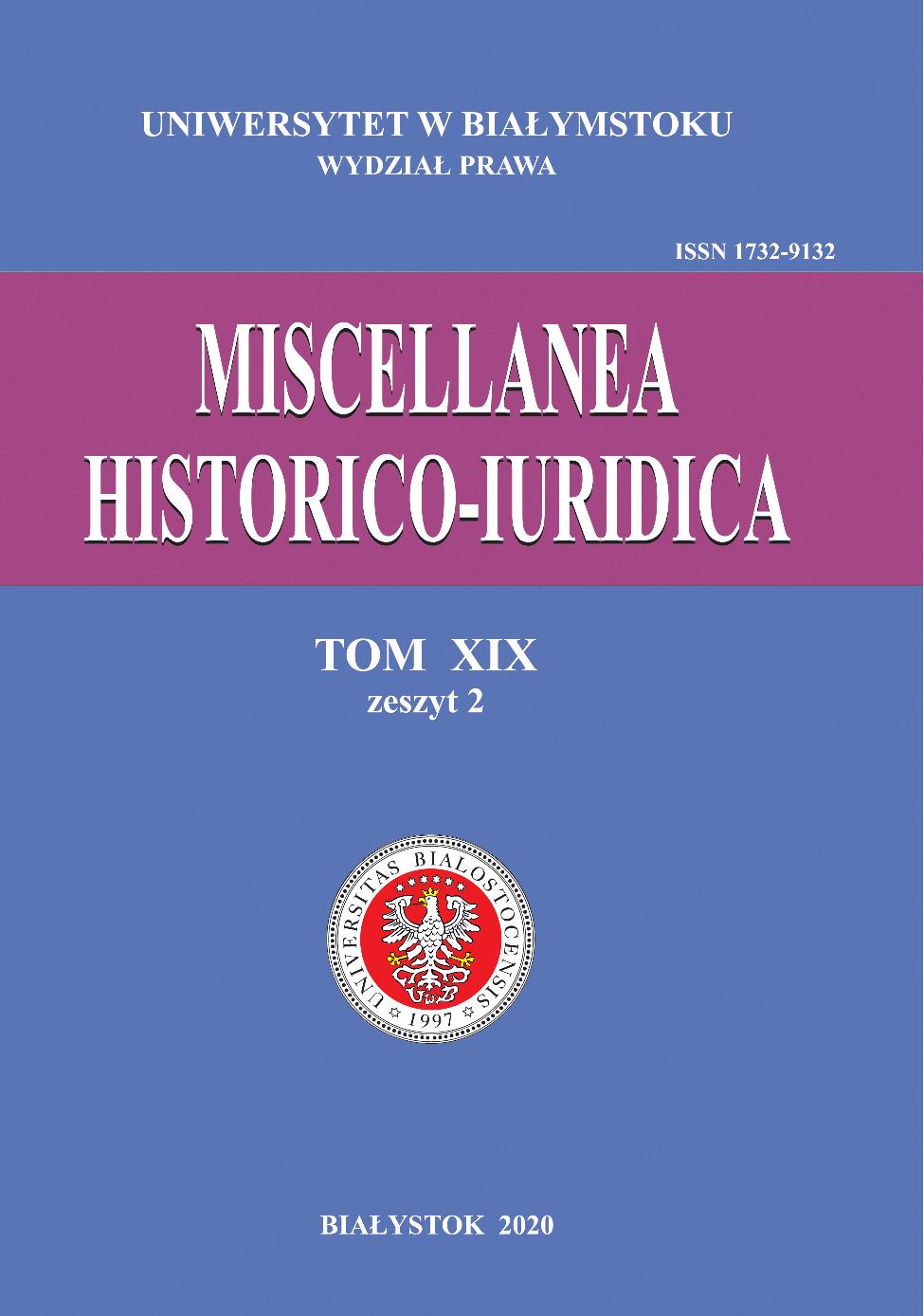Legal status of sportsman’s in Poland in the era of late socialism and in the first years after the transformation of the political system (1984-1996)
Keywords:
physical culture, sport, sportsman, socialism, political transformation, sports lawAbstract
The main objective of this article is to present an overall insight into the legal status of sportsmen in Poland, from 1984 to 1996, i.e., in the period when the sports system was thoroughly transformed. The study uses historical and formal-dogmatic methods. In addition, the author interviewed a long-time curator of Legia Warsaw Museum and a sports fan, perfectly familiarised with reality of sport in Poland at that time, which enriches theoretical and legal considerations with a practical value. The research strives to draw attention to the importance of political aspects in the sports sector within the era of late socialism and in the first years after the transformation of political system in Poland. Additionally, it also aims to discuss their ramifications for legal protection of players. The author highlights the implications of interventionist regulatory model in sport which was adopted by the authorities of People’s Republic of Poland by virtue of the Physical Culture Act of 3 June 1984. The article also presents the main tasks and importance of the state in process of creating the sports reality, in particular the position of Polish athletes. The article includes theoretical and practical issues related to amateur sport under the socialism in Poland. The research is intended to compare the regulatory framework concerning sportsmen stated in the Physical Culture Act of 3 June 1984 with the provisions of the Physical Culture Act of 18 January 1996. The author undertakes an evaluation of specific legal institutions from the point of view of the competition between Polish sport on the world stage and dynamic development of professional sport.
References
Ustawa z dnia 26 czerwca 1974 r. Kodeks pracy (Dz.U. 1974 nr 24, poz. 141).
Ustawa z dnia 3 lipca 1984 r. o kulturze fizycznej (Dz.U. 1984 nr 34, poz. 181).
Rozporządzenie Ministra Pracy, Płac i Spraw Socjalnych z dnia 2 września 1985 r. w sprawie zasad i trybu zaliczania okresów pobierania stypendiów sportowych do okresów zatrudniania (Dz.U 1985 nr 46, poz. 234).
Ustawy z dnia 12 listopada 1985 r. o zmianach w organizacji oraz zakresie działania niektórych naczelnych i centralnych organów administracji państwowej (Dz.U. z 1985 nr 50, poz. 262).
Ustawa z dnia 30 maja 1989 r. o zmianie upoważnień do wydawania aktów wykonawczych (Dz.U. 1989 nr 35, poz. 192).
Ustawa z dnia 18 stycznia 1996 r. o kulturze fizycznej (Dz.U. 1996 nr 25, poz. 113).
Ustawa z dnia 4 listopada 1999 r. o zmianie ustawy o kulturze fizycznej (Dz.U. 1999 nr 96, poz. 1106).
Wyrok ETS z dnia 15 grudnia 1995 r. w sprawie C-415/93 Union royale belge des sociétés de football association ASBL v Jean-Marc Bosman, Royal club liégeois SA v Jean-Marc Bosman and others and Union des associations européennes de football (UEFA) v Jean-Marc Bosman, Zb. Orz. UE 1995 I-04921.
Chełmecki J. (red.), Społeczno-edukacyjne oblicza współczesnego sportu i olimpizmu, Warszawa 2009.
Gmur M., Bojkot Igrzysk Olimpijskich w Moskwie i Los Angeles w świetle tygodnika ”Sportowiec”, „Acta Universitatis Lodziensis. Folia Historica. - [Z.]” 2010, nr 85.
Kazimierczak M., Kosiewicz J., Sport i turystyka. Uwarunkowania historyczne i wyzwania współczesności, Poznań 2013.
Klisiński J., Ekonomika kultury fizycznej i sportu, Katowice 1986.
Klisiński M., Szwaja M., Sport w polityce władz partyjnych i państwowych w schyłkowym okresie Polski Ludowej (1980–1989), „Prace Naukowe Akademii im. Jana Długosza w Częstochowie. Kultura Fizyczna” 2013, t. XII, nr 1.
Łuczak M., Oszustwo dopingowe w sporcie wyczynowym wśród kobiet w latach 1950-2017, „Rozprawy Naukowe AWF we Wrocławiu” 2018, nr 60.
Matras T., Bojkot igrzysk olimpijskich w Moskwie w 1980 r. przykładem wykorzystania sportu w celach politycznych w świetle wybranych źródeł drukowanych, „Prace Naukowe Akademii im. Jana Długosza w Częstochowie. Kultura Fizyczna” 2011, t. 10.
Nowakowski A., Propozycje zmian modelu organizacyjnego kultury fizycznej w Polsce w 1981 r. Kartka z najnowszych dziejów kultury fizycznej, „Prace Naukowe WSP w Częstochowie” 2000, z. 3.
Pasko A., Społeczno-polityczne aspekty sportu w ZSRR i krajach bloku socjalistycznego do 1989 r., „Prace Naukowe Akademii im. Jana Długosza w Częstochowie. Kultura Fizyczna” 2012, nr 11.
Pasko A., Sport wyczynowy w polityce państwa 1944-1989, Kraków 2012.
Pilarski S., „Odmówił powrotu do kraju” – ucieczki piłkarzy z PRL na Zachód, „Pamięć i Sprawiedliwość” 2014, nr 2 (24).
Riordan J., Sport in Soviet Society. Development of sport and physical education in Russia and the USSR, Cambridge 1977.
Szymański L. (red.), Tradycje a współczesny rozwój kultury fizycznej w Polsce, Wrocław 1993.
Szymański L., Kultura fizyczna i turystyka w polityce Polski Ludowej 1944–1989, Wrocław 2004.
Szymański L., Kultura fizyczna w polityce PRL w latach 1980–1989, „Wychowanie Fizyczne i Sport” 1999, t. XLIII, nr 1-2.
Wojtaszyn D., Sport w cieniu polityki. Instrumentalizacja sportu w NRD, Wrocław 2011.
Downloads
Published
Issue
Section
License
Copyright (c) 2021 Uniwersytet w Białymstoku (entire issue as a whole); Radosław Niwiński (article)

This work is licensed under a Creative Commons Attribution-ShareAlike 4.0 International License.







